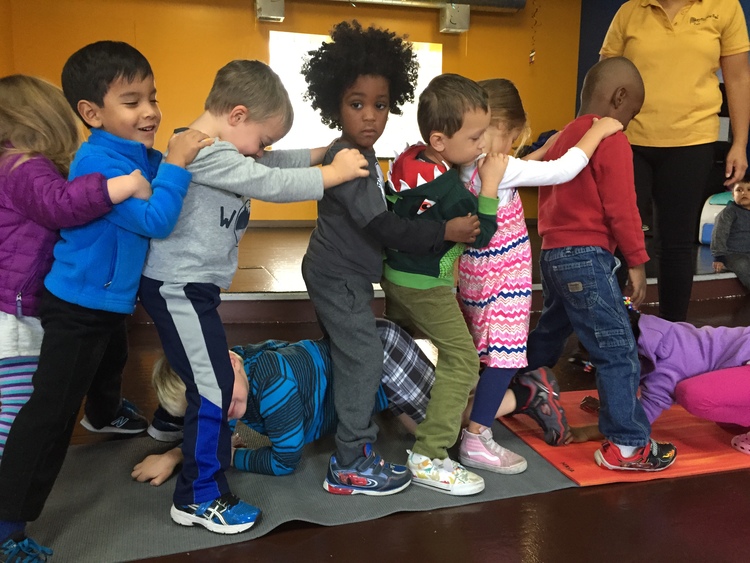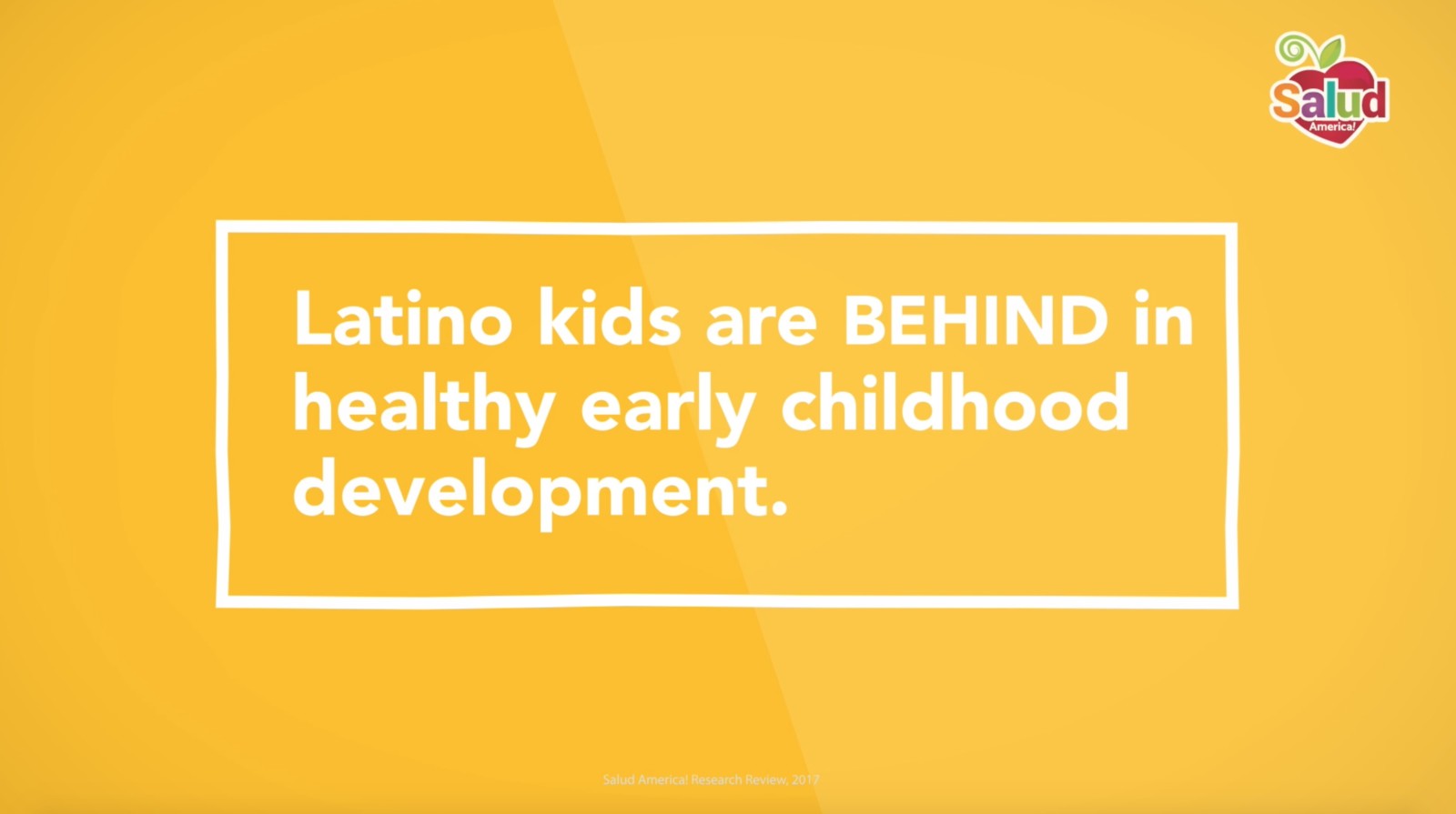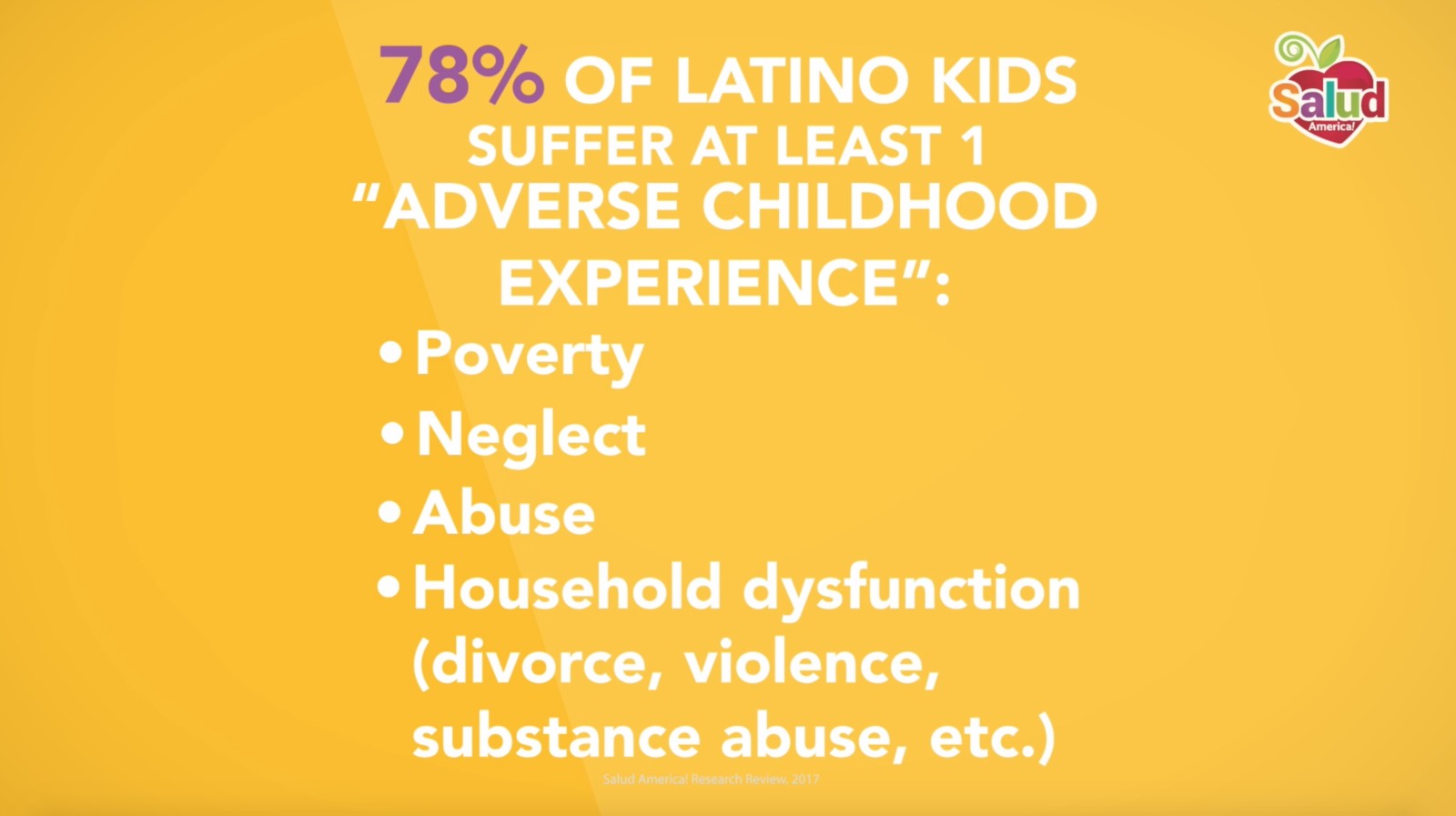
Share On Social!
This is part of the Salud America! The State of Latino Early Childhood Development: A Research Review »
Introduction
Childhood development is a dynamic, interactive process that is not predetermined by genetics, but is hindered by lack of proper care, services, and support. Proper childhood development is critical because 90 percent of brain development occurs by age 5.
 Latino childhood development is particularly important because Latinos make up 26 percent of US children younger than 5. The Latino population is one of the fastest-growing U.S. demographics, yet 12 million Latinos live below the poverty level.1–3 As such, many Latino children are at risk of not receiving the care and services they need during their formative years, which may have negative effects on their early development and long-lasting consequences into their adulthood. Less than half of kids from low-income families are starting kindergarten ready to learn, compared to three-fourths of kids from middle-income families.4
Latino childhood development is particularly important because Latinos make up 26 percent of US children younger than 5. The Latino population is one of the fastest-growing U.S. demographics, yet 12 million Latinos live below the poverty level.1–3 As such, many Latino children are at risk of not receiving the care and services they need during their formative years, which may have negative effects on their early development and long-lasting consequences into their adulthood. Less than half of kids from low-income families are starting kindergarten ready to learn, compared to three-fourths of kids from middle-income families.4
For example, although research has shown the many health, social and emotional, and cognitive benefits of high-quality preschool programs, U.S. Latino children have the lowest participation in these programs among the major racial and ethnic populations.5,6 Less than half of Latino children are enrolled in any early learning program and for those who do attend, program quality varies widely.7Poverty confounds participation in quality early learning programs.
Lack of participation in preschool programs, in combination with other factors such as infrequent exposure to preliteracy activities at home, has led to reduced school readiness in Latino children that may result in poor long-term outcomes.5,6
Lack of participation may stem from lack of availability. In a study about the location of child centers across eight states, 42% of children younger than 5 live in areas known as child care deserts, which either have no child care centers or so few centers that there are more than three times as many children as there are spaces in centers. The availability of child care centers is in a state of crisis for Latino families. More information about families’ proximity to child care programs can inform local, state, and federal efforts to increase access to early childhood programs.
 Early childhood experiences in school and at home have the potential to shape child development, both positively and negatively. Adverse childhood experiences (ACEs) are of particular concern as they can lead to a multitude of issues that can affect individuals for a lifetime.
Early childhood experiences in school and at home have the potential to shape child development, both positively and negatively. Adverse childhood experiences (ACEs) are of particular concern as they can lead to a multitude of issues that can affect individuals for a lifetime.
Many children, including Latino children, have been exposed to ACEs that have in some way impaired their socioemotional development, academic achievement, and overall health and wellbeing.8,9
Other factors affect the healthy development of Latino children. Children living in underserved areas have limited access to healthy food. Poor nutrition can lead to a host of issues including poor physical health and cognitive difficulties. Limited access to fruits and vegetables, and overconsumption of fast foods and unhealthy snacks, can lead to overweight and obesity—a growing area of concern for Latino children10—that increases their risk of poor long-term outcomes in many developmental areas including physical and mental health, education, psychosocial functioning, and future socioeconomic status.11
Despite the disparities mentioned above, many Latino children have been shown to have healthy social and emotional development, and these qualities may help to attenuate some of the negative effects of their disadvantages.1,12 Therefore, preserving and improving upon these socioemotional strengths is crucial for ensuring healthy early childhood development in Latino children.
Moreover, more than 400,000 Latino children younger than 4 were not counted in the 2010 U.S Census.13 Ensuring Latinos are accurately counted in the 2020 Census is important for ensuring equitable investment for healthy early childhood development in Latino children.
This research review summarizes the current literature on the issues mentioned above and the programs and policies for improving these areas of early childhood development in Latino children.
Methodology
For this research review, electronic searches of PubMed, Google, Google Scholar, and government and organization websites were performed to identify literature that was relevant to early childhood development in Latino children.
Combinations of the following MeSH terms were used: “Latino,” “Hispanic Americans”[Mesh], “Mexican Americans”[Mesh], “Child”[Mesh], “Policy”[Mesh], “Public Policy”[Mesh], “Policy Making”[Mesh], “Health Policy”[Mesh], “Infant”[Mesh], “Child, Preschool”[Mesh], “Growth and Development”[Mesh], “Child Welfare”[Mesh], and “Infant Welfare”[Mesh]. Keywords included adverse childhood experiences, Latino, Hispanic, American, children, social, emotional, development, parenting practices, education, depression, school, preschool, Head Start, and teachers.
Included in this review were studies, expert commentaries, and policy statements addressing important aspects of early childhood development in Latino children, including disparities versus other races and ethnicities, factors associated with healthy and unhealthy development, and practices, programs, and policies for improving early childhood development in this population. Exclusion criteria included articles written in non-English language and studies conducted outside the United States. No limits were placed on publication date, but because of the breadth and depth of the topic, only the most recent and relevant literature was included. Older studies were included if they were deemed exceptionally important and relevant to current times.
From the initial search results, titles and abstracts were reviewed for relevance and cross-checked against inclusion/exclusion criteria. Full text was obtained for relevant articles meeting the inclusion criteria. Additional literature was found through hand searches of the bibliographies of articles captured through the initial electronic searches. Research on non-Latino children and older Latino children was included if deemed exceptionally important and potentially relevant to Latino children in some way.
More from our The State of Latino Early Childhood Development: A Research Review »
- Introduction & Methods
- Key Research Finding: Latino Childhood Trauma
- Key Research Finding: Healthy Lifestyles
- Key Research Finding: Early Care and Education
- Key Research Finding: Strategy—Improve Early Care
- Key Research Finding: Strategy—Boost School Readiness
- Key Research Finding: Strategy—Reduce Childhood Trauma
- Key Research Finding: Strategy—Incorporate Family Values
- Key Research Finding: Strategy—Support Moms
- Policy Implications
- Future Research Needs
References for this section »
1. Guerrero, A. D. et al. Early Growth of Mexican–American Children: Lagging in Preliteracy Skills but not Social Development. Matern. Child Health J. 17, 1701–1711 (2013).
2. Krogstad, J. M. Hispanics only group to see its poverty rate decline and incomes rise. Pew Research Center (2014).
3. Proctor, B., Semega, J. & Kollar, M. Income and Poverty in the United States: 2015. (2016). Available at: https://www.census.gov/library/publications/2016/demo/p60-256.html. (Accessed: 25th January 2017)
4. Isaacs, J. B. Starting School at a Disadvantage: The School Readiness of Poor Children. Brookings (2001).
5. US Department of Education. A Matter of Equity: Preschool in America. (2015).
6. Yoshikawa, H. et al. Investing in our future: The evidence base on preschool education. (Society for Research in Child Development, 2013).
7. White House Initiative on Educational Excellence for Hispanics. Early Learning: Access to A High Quality Early Learning Program. Available at: https://sites.ed.gov/hispanic-initiative/files/2014/05/WHIEEH-Early-learning-Fact-Sheet-FINAL_050614.pdf. (Accessed: 25th October 2017)
8. Braveman, P., Egerter, S., Arena, K. & Aslam, R. Early Childhood Experiences Shape Health and Well-Being Throughout Life. (Robert Wood Johnson Foundation, 2014).
9. Bright, M., Knapp, C., Hinojosa, M., Alford, S. & Bonner, B. The Comorbidity of Physical, Mental, and Developmental Conditions Associated with Childhood Adversity: A Population Based Study. Matern. Child Health J. 20, 843–853 (2016).
10. Perry, A., Patlak, M., Ramirez, A. G. & Gallion, K., J. Making Healthy Food and Beverages the Affordable, Available, Desired Choices Among Latino Families. (2015).
11. Liu, G. C., Hannon, T., Qi, R., Downs, S. M. & Marrero, D. G. The obesity epidemic in children: Latino children are disproportionately affected at younger ages. Int. J. Pediatr. Adolesc. Med. 2, 12–18 (2015).
12. Galindo, C. & Fuller, B. The social competence of Latino kindergartners and growth in mathematical understanding. Dev. Psychol. 46, 579–592 (2010).
13. Child Trends. Dissemination of Child Trends report: “The Invisible Ones: How Latino Children Are Left Out of Our Nation’s Census Count”. Child Trends
By The Numbers
142
Percent
Expected rise in Latino cancer cases in coming years



